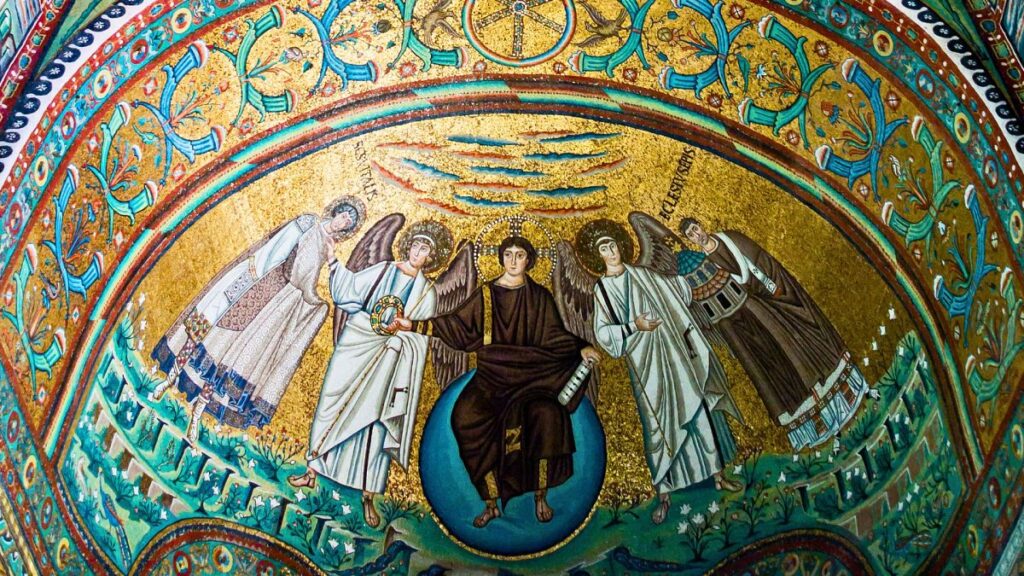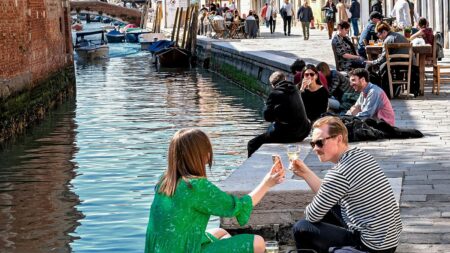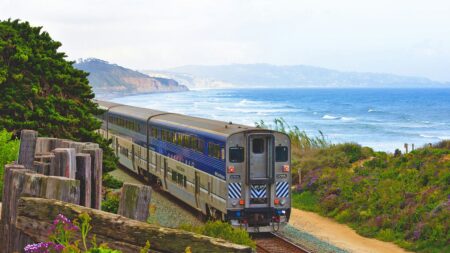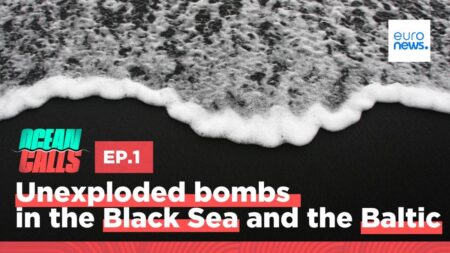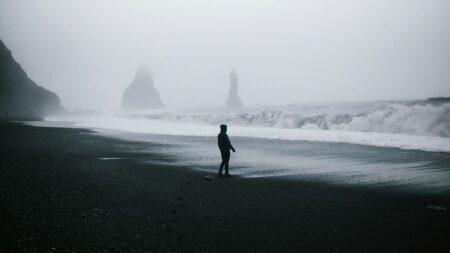From historic basilicas to Adriatic beaches, this northern Italian city offers the best of both worlds.
Located in Italy’s culturally rich Emilia-Romagna region, Ravenna offers a fascinating blend of art, churches and historical landmarks.
The city’s main claim to fame lies in its extraordinary collection of Byzantine mosaics, which adorn its ancient churches and monuments.
These intricate works of art, dating back to the 5th and 6th centuries, depict biblical scenes, saints and Byzantine emperors with intricate detail and craftsmanship.
The UNESCO-listed Basilica di San Vitale and the Mausoleum of Galla Placidia are outstanding examples of Ravenna’s mosaic mastery, drawing art enthusiasts worldwide to admire their exquisite beauty.
Ravenna’s cultural heritage extends beyond its monuments and artworks to encompass its literary legacy.
The city served as the final resting place of Dante Alighieri, the father of the Italian language. His tomb in the 13th-century Basilica di San Francesco remains a pilgrimage site for literature enthusiasts and admirers of his seminal work, ‘The Divine Comedy’.
Beyond culture and UNESCO sites, Ravenna offers a wealth of restaurants, bike trails and bars that come alive in the humid summer season.
Here are our top reasons to take a trip to Ravenna this summer.
Wander around historic basilicas
Ravenna has an astonishing number of historical and religious sites. Many exquisite early Christian mosaics have also survived the ruins of history and can be found in buildings across the town.
While religious architecture isn’t everyone’s idea of a fun day out, magnificent sites such as the Basilica of San Vitale should help persuade you otherwise.
This hauntingly beautiful Basilica is a marvellous example of early Christian Byzantine art and architecture in Europe. Though the outside may appear a little drab, the interior is rich with dazzling mosaics.
Numerous other churches and Basilicas are historically and culturally significant, including Basilica di Sant’Apollinare Nuovo and Basilica di San Vitale.
Admire Byzantine mosaics
Ravenna is renowned for its exceptional collection of 5th and 6th century Byzantine mosaics.
These exquisite works of art represent some of the finest examples of Byzantine mosaic craftsmanship worldwide and some have earned UNESCO World Heritage status for their cultural significance.
One of the most iconic landmarks showcasing Ravenna’s Byzantine mosaics is the Basilica di San Vitale, a masterpiece of Byzantine architecture.
Inside the basilica, you can see intricate mosaics that depict scenes from the Old and New Testaments and portraits of Byzantine emperors and Empress Theodora and her court.
The colourful mosaics cover the basilica’s walls, arches and domes, creating an extraordinary tableau.
Another must-see destination for art and culture lovers is the Mausoleum of Galla Placidia, a small but magnificent chapel adorned with celestial blue mosaics.
The mausoleum’s interior is decorated with intricate geometric patterns, floral motifs, and vivid depictions of biblical scenes, including the Good Shepherd and Jonah and the Whale story.
Sunbathe on beautiful beaches
Ravenna’s impressive coastline along the Adriatic Sea is dotted with pristine beaches, charming seaside towns, and luxurious beach clubs and resorts.
Just a few kilometres from the city centre, towards the Adriatic Sea, nine beach towns make up Ravenna’s coastline, each with its own unique vibe.
One of Ravenna’s most popular beach destinations is Marina di Ravenna, a vibrant seaside resort town known for its wide sandy beaches and bustling promenade.
Here, you can soak up the sun on the spacious beachfront, take a refreshing dip in the Adriatic Sea, or indulge in water sports such as windsurfing, sailing and kiteboarding.
Marina di Ravenna also has a vibrant nightlife, with beach clubs and bars offering live music, cocktails and sunset views.
If you want a more secluded beach experience, Lido di Dante offers a pristine stretch of coastline surrounded by lush pine forests and sand dunes.
This unspoiled paradise is perfect for nature lovers and outdoor enthusiasts, with ample opportunities for hiking, birdwatching, and picnicking along the shore.
Visit Dantes’s final resting place
Dante Alighieri, the renowned poet and author, found his final resting place in Ravenna, Italy, marking a significant chapter in the city’s cultural history.
After being exiled from his native Florence, Dante spent the last years of his life in Ravenna under the protection of the city’s ruling family, the Guidi.
During this period, he completed his masterpiece, ‘The Divine Comedy’, which remains one of the greatest literary works of all time.
Dante’s tomb is in the 13th-century Basilica di San Francesco, a modest yet elegant church.
The tomb is a simple structure adorned with a white marble relief depicting Dante in his later years, surrounded by allegorical figures representing his major works.
Visitors to the basilica can pay their respects to the poet and reflect on his enduring legacy as one of Italy’s greatest literary figures.
Discover brilliant biking routes
With its flat terrain and well-maintained paths, Ravenna is a cyclist‘s paradise, catering to riders of all levels and abilities.
One of Ravenna’s most popular cycling routes is the Ciclovia del Sole, or Sun Cycle Path, which stretches for approximately 25 kilometres from the city centre to the Adriatic coast.
This scenic trail meanders through lush farmland past vineyards and orchards, offering glorious views of the surrounding countryside.
As you pedal along the Ciclovia del Sole, you’ll encounter charming villages, ancient Roman ruins, and historic churches, providing ample opportunities to explore Ravenna’s rich cultural heritage.
If you want a longer ride, the Parco del Delta del Po offers an extensive cycle trail network that winds through the UNESCO-listed Po Delta Regional Park.
Spanning over 540 square kilometres, this pristine natural area is home to a diverse array of wildlife, including rare bird species and wetland habitats.
Feast on local dishes
The food scene in Ravenna, Italy, is a delicious fusion of traditional Italian cuisine and regional specialities from the Emilia-Romagna region. Renowned for its fresh, locally sourced ingredients and rich culinary heritage, Ravenna has a thriving foodie culture.
One of the standout dishes in Ravenna’s gastronomic offering is piadina, a thin flatbread made from flour, water and lard, traditionally filled with various cheeses, cured meats and vegetables.
This tasty street food is a beloved staple of Ravenna’s culinary landscape for its simplicity and versatility.
Another must-try dish in Ravenna is cappelletti, small handmade pasta parcels filled with a rich mixture of meats, cheeses and herbs, served in a delicate broth.
These bite-sized dumplings are a comforting and hearty choice, perfect for indulging in a leisurely lunch after a morning of exploring.
Seafood lovers will love the fresh catch-of-the-day options served at Ravenna’s coastal restaurants and trattorias. The Adriatic Sea provides a bounty of culinary delights, from grilled fish and seafood risotto to fried calamari and shellfish pasta.
Unwind with an aperitif
The Italian equivalent to ‘happy hour’ is an aperitif, and Ravenna is known for its vibrant aperitif culture. Rooted in the Italian concept of ‘aperitivo’, or ‘pre-dinner drink’, this ritual involves enjoying a leisurely drink accompanied by a selection of small and tasty appetisers before dinner.
One of the hallmarks of Ravenna’s aperitif culture is the ‘aperitivo hour’, typically held in the early evening at lively bars, cafes and restaurants throughout the city.
Locals and visitors gather at their favourite watering holes to relax and socialise over a refreshing drink and a selection of complimentary snacks, ranging from olives and cheese to bruschetta and crostini.
One of the most popular drinks enjoyed during aperitivo hour in Ravenna is the classic Aperol Spritz, a refreshing blend of Aperol, prosecco and soda water, served over ice with a slice of orange.
Other boozy beverage choices include the Negroni, a bittersweet cocktail made with gin, Campari and sweet vermouth, and the Hugo, a light and floral drink featuring elderflower liqueur, prosecco and fresh mint.
Read the full article here


